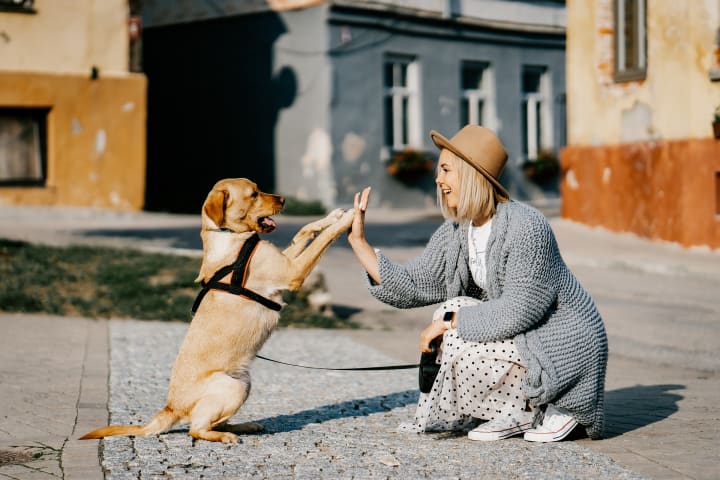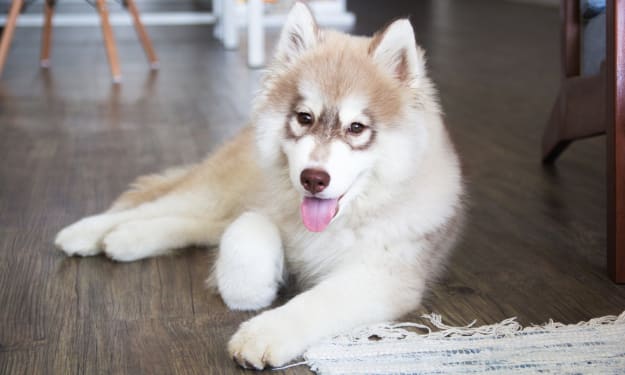The Ultimate Guide To PUPPY TRAINING
Here is a comprehensive guide to puppy training

Training is a process of teaching a puppy new skills and behaviors, and shaping their behavior for the future. It's important to start training as soon as possible, as puppies have a high capacity for learning and adapting. The goal of training is to create a well-behaved, obedient, and happy pet that can coexist with humans and other animals. Training can also improve the bond between you and your puppy, as well as increase their confidence and overall well-being. Positive reinforcement and consistency are key elements of successful puppy training, along with patience and understanding.
Here is a comprehensive guide to puppy training:
1. Establish a routine: Consistency is key in training a puppy. Set aside specific times for feeding, potty breaks, playtime, and training sessions.
2. Use positive reinforcement: Reward your puppy with treats, praise, or affection for good behavior. Avoid using physical punishment or shouting.
3. Potty training: Take your puppy outside to the same spot regularly and reward them when they go potty. Supervise your puppy to prevent accidents inside the house.
4. Basic commands: Start with simple commands such as "sit", "stay", "come", and "heel". Repeat the command and reward the puppy for following it. Gradually increase the difficulty level as your puppy gets better at following commands.
5. Socialization: Introduce your puppy to new people, animals, and environments to help them become confident and well-behaved.
6. Leash training: Get your puppy used to wearing a collar and walking on a leash. Start with short walks and gradually increase the length as your puppy gets more comfortable.
7. Chewing: Provide your puppy with appropriate chew toys to redirect their chewing behavior away from furniture, shoes, or other household items.
8. Barking: Train your puppy not to bark excessively by teaching them the "quiet" command and rewarding them for not barking.
9. Separation anxiety: Gradually increase the amount of time you spend away from your puppy until they are comfortable being alone for short periods of time.
10. Advanced training: Once your puppy has mastered basic commands and socialization, consider advanced training such as obedience training, agility training, or scent work.
11. Avoid over-training: Keep training sessions short (5-10 minutes) and end them on a positive note.
12. Be patient: Training a puppy takes time and consistency. Don't get discouraged if your puppy doesn't learn a command right away.
It's important to remember that every puppy is different and will learn at their own pace. With patience, positive reinforcement, and consistency, you can successfully train your puppy.
training a puppy takes time and patience. Consistency and positive reinforcement are key to success. If you need help, consider working with a professional dog trainer.
A happy puppy is one that is comfortable, well-adjusted, and content. Here are some things you can do to help keep your puppy happy:

1. Provide plenty of exercise: Regular exercise will help keep your puppy physically fit and mentally stimulated.
2. Give them attention: Spend quality time with your puppy, playing with them, training them, and providing affection.
3. Feed them a balanced diet: Provide your puppy with a balanced diet that meets their nutritional needs.
4. Offer plenty of opportunities for socialization: Expose your puppy to new people, animals, and environments to help them become confident and well-adjusted.
5. Provide a safe and comfortable environment: Make sure your puppy has a safe, comfortable, and secure place to sleep and rest.
6. Train and challenge their mind: Engage your puppy's mind by providing them with toys, puzzles, and training sessions.
7. Maintain a consistent routine: Consistent feeding, potty breaks, playtime, and training sessions can help reduce stress and provide a sense of security for your puppy.
By taking these steps, you can help ensure that your puppy is happy and well-adjusted. A happy puppy is more likely to develop into a well-behaved, obedient, and confident adult dog.





Comments
There are no comments for this story
Be the first to respond and start the conversation.